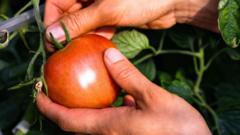As human rights concerns rise over Xinjiang province's treatment of Uyghurs, a new investigation sheds light on the potential origin of various Italian tomato purees sold in the UK, drawing alarming connections to Chinese production practices linked to forced labor.
Investigation Uncovers Possible Links Between 'Italian' Tomato Purees and Chinese Forced Labour

Investigation Uncovers Possible Links Between 'Italian' Tomato Purees and Chinese Forced Labour
A BBC report reveals troubling evidence suggesting that popular 'Italian' tomato purees sold in UK supermarkets may contain tomatoes sourced from Chinese farms relying on forced labor.
Italian tomato purees, marketed by various supermarkets in the UK, could be derived from tomatoes sourced from China, specifically Xinjiang province, where widespread allegations of forced labor have emerged. An investigation by the BBC has revealed that certain products labeled as "Italian" contain ingredients that may have been harvested under coercive conditions affecting Uyghur and other predominantly Muslim populations in the region.
Brands such as Tesco and Asda have put forward products promoting themselves as containing “Italian grown tomatoes” or simply labeled “Italian” tomato purées. A total of 17 products, predominantly private-labels in UK and German stores, were found to have likely Chinese tomato content based on testing commissioned by the BBC’s World Service.
Evidence indicates that deporting a significant portion of China's tomato production to international markets originates from Xinjiang, where activists claim human rights violations are rampant, including detentions of over a million Uyghurs in purported "re-education camps.” While China denies the allegations of forced labor, insisting on the legality of workers' rights, human rights organizations and various UN reports contradict this claim.
The BBC's investigation highlighted testimonies from individuals who reported enduring forced labor in Xinjiang. Ahmed (a pseudonym) noted that prison authorities informed workers that the tomatoes they harvested were intended for export. Mamutjan, a Uyghur who was imprisoned for travel irregularities, recounted brutal punishment for failing to meet stringent tomato-picking quotas.
Using shipping data analysis, the investigation traced the path of Xinjiang tomatoes being funneled into Europe and Italy, identifying Antonio Petti’s company as a major recipient of tomato paste from Xinjiang Guannong and its subsidiaries. This Italian firm produces both branded and private-label tomato products found in UK supermarkets, heightening concerns about the source of ingredients.
Lab tests comparing 64 tomato purees revealed a mix of genuine Italian products and those containing Chinese tomatoes, primarily linked to the Petti group. The supermarket chains have contested these findings, conducting internal audits that, they claim, produced no evidence of Chinese tomato inclusion. Reactions have varied, with Tesco halting supplies and Lidl admitting to previously using Chinese tomatoes temporarily during a supply crisis.
The UK’s handling of these allegations has drawn criticism; while stringent US legislation prohibits imports from Xinjiang, the UK allows self-regulation among companies, raising concerns that it could become a destination for forced labor goods.
Dario Dongo, a journalist and food attorney, emphasized the broader implications of these findings for food pricing. As consumers encounter lower-cost products, the question arises: what ethical price are we willing to pay? The ongoing debate about food supply chains underscores the critical need for transparency in the sourcing of products, particularly in light of the harrowing realities shaping them.




















